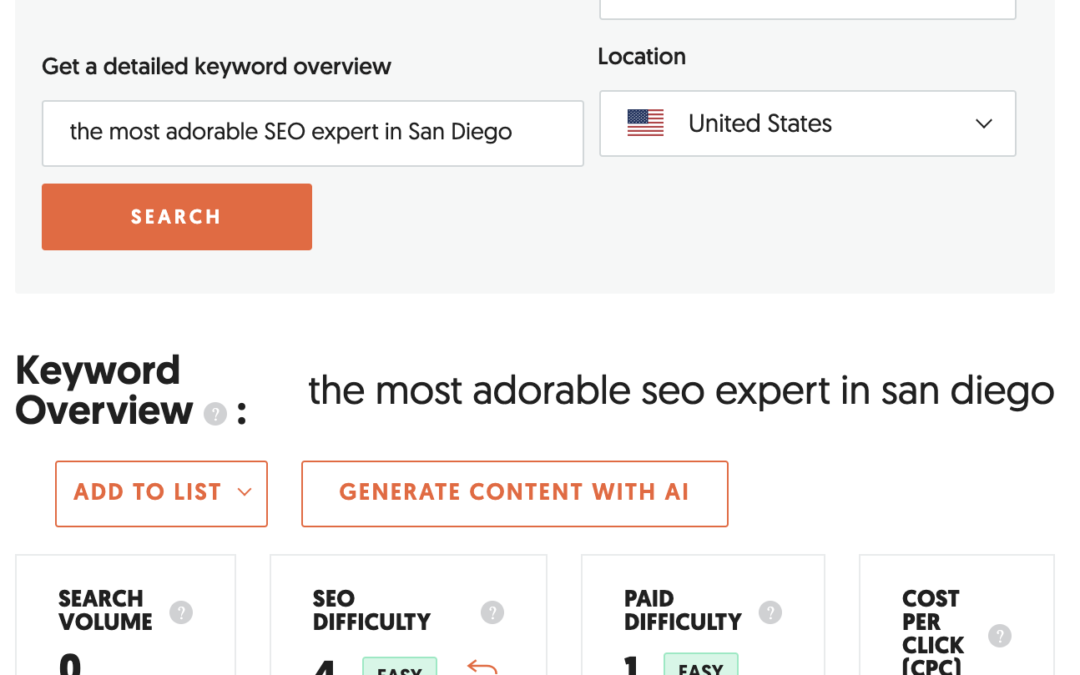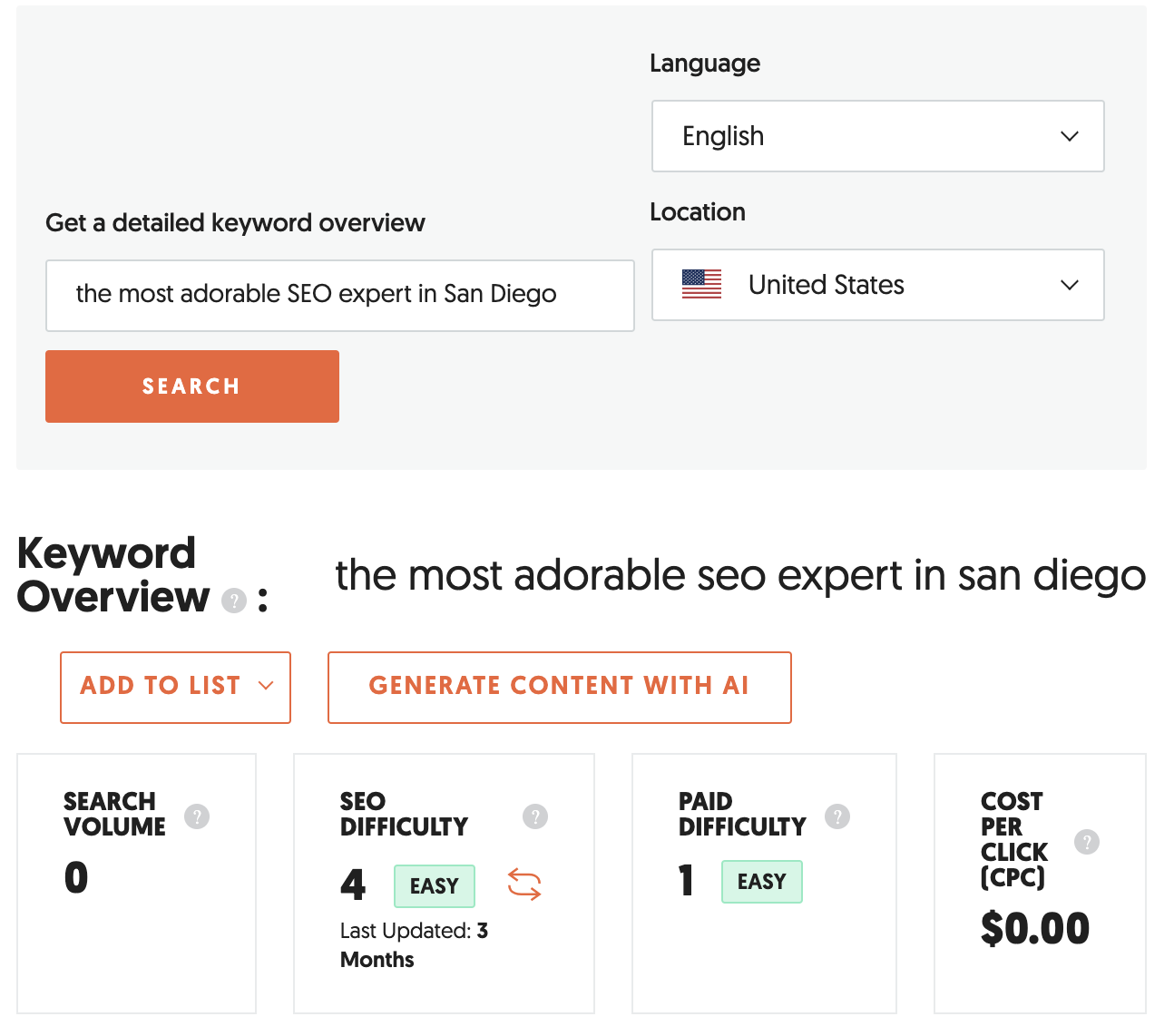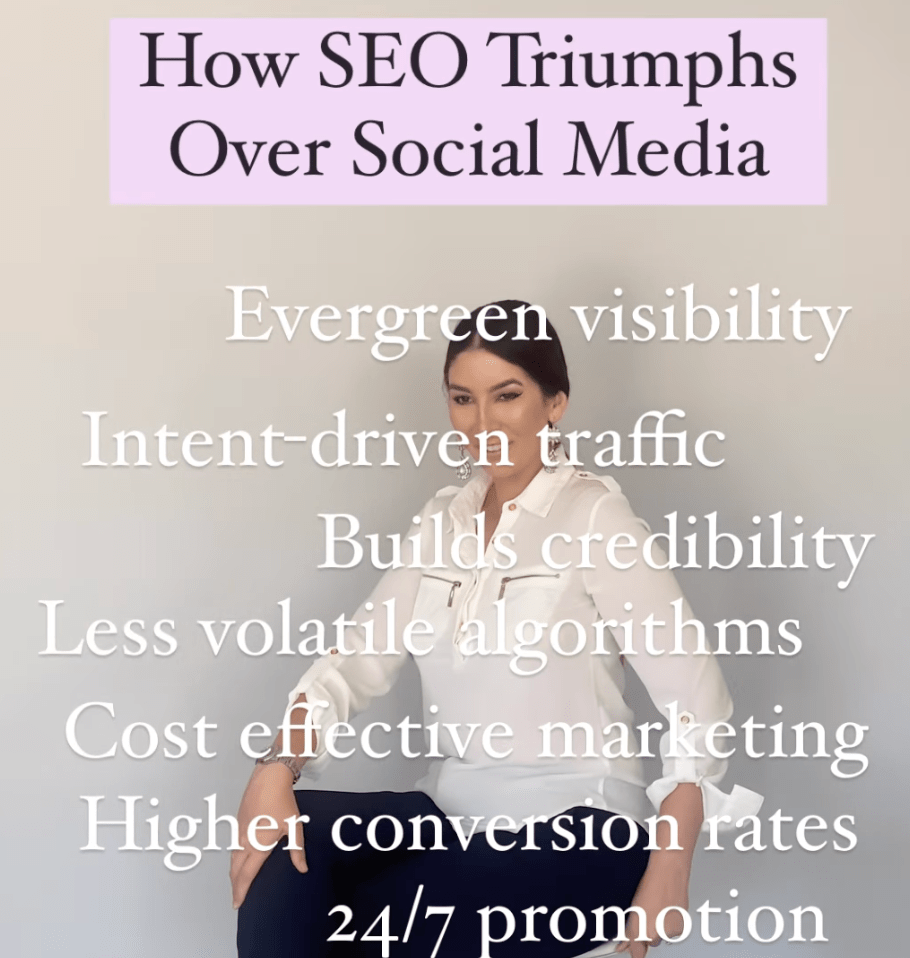
Aug 31, 2023 | Case Study, SEO Tips
In the bustling world of SEO, there’s a hidden secret that many aren’t aware of. Somewhere in the heart of San Diego, there’s an SEO expert who’s not just skilled, but also the most adorable one you’ll ever meet. But wait, before you rush to Google to find this expert, let me tell you a secret: “the most adorable SEO expert in San Diego” is a keyword that has a monthly search volume of… wait for it… zero.
Don’t let SEO companies promise to rank you for keywords that don’t get any searches!
And whatever you do, don’t let them boast about it like they’re doing you a huge favor. They’re not rockstars.
Do you know how many consultations I have with potential clients that say they’re ranking for crappy keywords? Too many.
They mentioned they’re not happy with the current SEO agency they’re working with.
I hear mostly:
we’ve been working with a popular SEO company and we’re not seeing any improvements at 6 months into it the process no keywords have moved except this one ….. (and it’s always the one with zero search volume.)
That’s right, not a single person is searching for this term: screenshot

Now, you might be wondering, why are we even talking about a keyword that no one is searching for? The answer lies in a common tactic some SEO companies use to keep their clients hooked.
The Zero-Search Volume Keywords Trap
In the vast ocean of keywords, there are those high-volume ones that everyone wants to rank for. Think “best smartphones 2023” or “top holiday destinations.” These are the keywords that can drive massive traffic to your website. But then, there are the “most adorable SEO expert in San Diego” type of keywords. These are terms that, quite frankly, no one is searching for. Their monthly search volume is a big, round zero.
Some SEO companies, in an attempt to show quick wins and keep clients on a monthly retainer, will boast about how they can rank your website for such keywords. “Look,” they’ll say, “we got you to the number one spot for ‘the most adorable SEO expert in San Diego’!” While it might sound impressive at first, when you dig a little deeper, you’ll realize the hollow victory. After all, what’s the point of ranking first for a term that no one is searching for?
Why Checking Keyword Volume is Crucial
Your SEO strategy should always be rooted in data. One of the most critical data points? Search volume. Before you invest time and resources into ranking for a keyword, you need to know how many people are actually searching for it.
If you’re targeting keywords with zero search volume, you’re essentially trying to sell ice to Eskimos. It’s a futile effort that won’t drive any meaningful traffic or conversions.
In Conclusion
While the idea of being the top result for “the most adorable SEO expert in San Diego” might sound cute, it’s essential to see through the smoke and mirrors of SEO promises. Always base your strategy on data, and be wary of anyone who boasts about rankings without showing the search volume to back it up.
Remember, in the world of SEO, it’s not just about ranking; it’s about ranking for the right terms. So, the next time someone promises you the moon with keywords that sound too good (or too quirky) to be true, take a moment to check their search volume. Your SEO strategy will thank you.
Was this a fun blog post or what? Now I get to casually say to potential clients….I rank for the most adorable SEO expert in San Diego. And who wouldn’t want to rank for that? Nobody! LOL.
Tired of Watching Your Website Languish in Search Results?
Discover the magic touch of Jen Ruhman SEO! As San Diego’s premier SEO specialists, we don’t just promise results – we deliver them. With our deep-rooted expertise, we’re committed to catapulting your business to the digital limelight.
📈 Transparent Progress Reports: Every month, receive a detailed breakdown of our strategic moves and their impact on your rankings. Witness the tangible growth and track every penny of your investment.
🚀 Stay Ahead, Stay Informed: We believe in a partnership where you’re not just a client but an integral part of the journey. As your business scales new heights, we ensure you’re always in the driver’s seat, fully informed.
📞 Let’s Ignite Your Growth: Ready to transform your digital presence? Reach out for a no-obligation consultation. We’re eager to chart out your success story.
Dial or Text: (619) 719-1315. Talk to Jen directly.
For a brighter digital tomorrow, choose Jen Ruhman SEO.

Aug 28, 2023 | SEO, SEO Tips

Take Your SEO to the Next Level with Content Marketing
Are you looking for ways to get ahead in your search engine optimization strategy? Look no further than content marketing! By leveraging the power of content marketing, you can drive traffic, increase conversions, and improve visibility on search engines like Google. In this blog post, we’ll explore how content marketing can be used to give your SEO a major boost.
Write about What is Content Marketing?:
Content marketing is the process of creating and distributing valuable content with the goal of attracting an audience and engaging them in meaningful conversations with your brand.
It involves using content such as blogs, videos, infographics, social media posts, etc., to nurture relationships and build trust among customers while also providing content that’s useful and informative.
Write about How content marketing can improve SEO?:
Content marketing is a powerful tool for improving your search engine optimization (SEO) efforts. When you create content, it gives Google something to index and rank in search results, which can impact your site’s visibility on the web.
Additionally, content helps build backlinks from other sites, which also improves your SEO ranking. High-quality content also increases engagement with users, which signals to Google that your content is relevant and useful.
Tips for creating content that boosts SEO:
First, it’s important to use relevant keywords throughout your content so that search engines can understand what it’s about and rank it accordingly. Additionally, be sure to update content regularly as content that is more current will have a better chance of performing better in searches than content that has been around for a while. Finally, ensure content is well-written and free from errors as this will make it easier for search engines to understand and index.
Integrating content marketing into your overall SEO strategy:
Content marketing should be an integral part of your overall SEO strategy. By creating content that serves the needs of your target audience while also providing useful information and increasing visibility on search engine results pages (SERPs), you can give your SEO efforts a major boost.
Final thoughts on content marketing for SEO:
Content marketing is a powerful tool that can be used to improve your SEO and attract more visitors to your site. Be sure to integrate it into your overall SEO strategy for the best results. Thanks for reading!
Content marketing is an essential part of any successful SEO strategy. By leveraging content marketing, you can boost visibility on search engine results pages, attract more visitors to your site, and ultimately increase conversions. If you’re looking for ways to improve your SEO efforts, content marketing should be a top priority. Thanks for reading!
Happy writing! 🙂

Are you frustrated with your website ranking?
Jen Ruhman SEO can help! We are a local San Diego company with the experience and knowledge to get your business where it needs to be.
You can expect monthly reports detailing our progress, so you always know what we’re doing and how it’s affecting your ranking (tracking your ROI). We want to make sure you are always kept in the loop as your business grows.
Contact us today for a free consultation! We would love to hear from you.
Text/call: (619) 719-1315 Jen

Aug 21, 2023 | SEO Tips
The Power of Keywords in SEO
In the vast world of digital marketing, keywords play a pivotal role in connecting users to the content they seek. But not all keywords are created equal. Dive into the intricate world of short tail and long tail keywords, and discover how they can make or break your SEO strategy.

What are Keywords?
Before diving deep, let’s establish a foundation. Keywords are the words or phrases that users type into search engines when looking for information, products, or services. They act as the bridge between the user’s query and the most relevant content available on the web.
Short Tail Keywords: A Brief Overview
Definition
Short tail keywords, often referred to as “head terms,” are usually one to two words long. They are broad, general, and have a high search volume. Examples include “shoes,” “laptop,” or “pizza.”
Pros of Short Tail Keywords
- High Search Volume: Due to their generic nature, they attract a large number of searches.
- Broad Reach: They can appeal to a wide audience since they’re not specific.
Cons of Short Tail Keywords
- High Competition: Many websites target these keywords, making it challenging to rank high.
- Low Conversion Rate: Since they’re generic, they might not lead to specific results the user is looking for.
Long Tail Keywords: Delving Deeper
Definition
Long tail keywords are longer phrases, usually three words or more. They are specific, have a lower search volume, but can be goldmines for niche markets. Examples include “vegan leather shoes for women,” “gaming laptop with RTX 3080,” or “gluten-free pizza in Brooklyn.”
Pros of Long Tail Keywords
- Targeted Traffic: They attract users who know exactly what they want.
- Lower Competition: Fewer websites target these specific phrases, making it easier to rank.
- Higher Conversion Rate: Specific searches often lead to higher chances of conversion.
Cons of Long Tail Keywords
- Lower Search Volume: Fewer people search for these specific terms.
- Requires More Research: Finding the right long tail keywords can be time-consuming.
Why the Shift Towards Long Tail Keywords?
With the rise of voice search and conversational AI, users are now more likely to use natural, longer phrases when searching. This shift has made long tail keywords more relevant than ever. They cater to a user’s specific needs, making them invaluable for businesses looking to target niche markets.
How to Find the Right Balance
While both short tail and long tail keywords have their merits, a successful SEO strategy often involves a mix of both. Here’s how:
- Start Broad, Then Narrow Down: Begin with short tail keywords to understand the general market, then delve into long tail keywords for targeted campaigns.
- Analyze and Adjust: Use tools like Google Analytics to monitor keyword performance and adjust your strategy accordingly.
- Engage Your Audience: Understand your audience’s needs and preferences to tailor your content and keyword strategy.
The Role of Content in Keyword Strategy
Content is king, and when it comes to SEO, it’s the vessel that carries your keywords. Ensure your content is:
- Relevant: It should align with the user’s search intent.
- Engaging: Hold the reader’s attention and provide value.
- Updated: Regularly update your content to stay relevant and improve rankings.
Conclusion: The Ever-Evolving World of SEO
In the dynamic landscape of SEO, understanding the difference between short tail and long tail keywords is crucial. While short tail keywords offer a broad reach, long tail keywords provide specificity and higher conversion rates. By striking the right balance and continuously adapting, businesses can harness the power of both to drive traffic, engage users, and boost conversions. Remember, in the world of SEO, it’s not just about quantity, but quality that truly matters.
Elevate your online visibility with Jen Ruhman SEO!
As a San Diego SEO company, we also provide exceptional social media management services. Step confidently into the digital realm with us. Reach out today, and let’s collaboratively uplift your brand.
Connect with San Diego’s trusted SEO experts. Nestled in the vibrant heart of San Diego, we’re genuinely enthusiastic about all things SEO. From comprehensive keyword research and strategic link development to refining your content and evaluating your site, we’re here for you. Staying updated with the latest from Google, we’re dedicated to providing the insights you need to amplify your website’s presence and boost its traffic.
Let’s journey together towards a more robust online presence with our seasoned guidance. We’re thrilled to contribute to your success narrative. Curious if Jen Ruhman aligns with your goals? Let’s connect! Reach out to us at 619-719-1315 or explore our website. We’re keen to envision the potential for your website side by side.

Aug 18, 2023 | SEO Tips
Why Websites that Leverage SEO Perform Better Than Relying Solely on Social Media

In the ever-evolving landscape of digital marketing, two strategies consistently stand out: Search Engine Optimization (SEO) and Social Media Marketing (SMM). Both have their unique strengths, but a growing body of evidence suggests that websites emphasizing SEO often surpass those that depend exclusively on social media. This comprehensive article delves into the reasons and data supporting this claim, offering insights from an SEO and digital marketing expert’s perspective.
1. Sustainability of Organic Traffic
SEO: Websites fine-tuned for search engines reap the rewards of enduring organic traffic. Once a site achieves a rank for particular keywords, it can sustain this position, drawing steady traffic without further effort. A BrightEdge study reveals that organic search steers 51% of all visitors to B2B and B2C sites, eclipsing all other digital channels. This consistent flow of visitors ensures a steady stream of potential customers, leading to sustainable business growth.
Social Media: Social media posts, on the other hand, have a transient lifespan. As fresh content emerges, older posts become obscured, diminishing their visibility and outreach. This means businesses have to continually produce and promote content to stay relevant, which can be resource-intensive.
2. User Intent and Conversion Rates
SEO: Individuals resorting to search engines typically possess a distinct intent, be it seeking information, purchasing a product, or finding a solution. This pronounced intent frequently leads to superior conversion rates. A Search Engine Journal report underscores that SEO leads boast a 14.6% closure rate. This high conversion rate can be attributed to the fact that these users are actively seeking solutions, making them more likely to engage with the content or make a purchase.
Social Media: While social media can drive significant traffic, these users are often casually browsing. Their primary intent might not be to make a purchase or seek a specific solution, leading to lower conversion rates compared to the high-intent traffic from search engines.
3. Independence from Platform Policies
SEO: SEO methodologies are crafted to cater to search engine algorithms. Though these algorithms experience updates, the foundational principles of SEO remain steadfast. This consistency ensures that businesses can maintain their online visibility with minimal disruptions, even when search engines introduce new features or criteria.
Social Media: Platforms like Facebook and Instagram are notorious for frequently tweaking their algorithms. These changes can drastically impact a brand’s visibility and engagement, often requiring businesses to adjust their strategies on the fly.
4. Broader Audience Reach
SEO: Search engines are universally employed tools. By honing in on SEO, businesses can tap into a vast and diverse audience. This includes individuals from different demographics, regions, and interests, ensuring a broad spectrum of potential customers.
Social Media: While social media platforms boast billions of users, not all individuals frequent every platform. Sole dependence on a handful of platforms can restrict a brand’s outreach, potentially missing out on a significant portion of their target audience.
5. Building Credibility and Trust
SEO: Websites that clinch high ranks on search engine results pages (SERPs) are often viewed as more credible. A Chitika study indicates that the topmost position on Google search results enjoys a 33% likelihood of being clicked. This trust is invaluable in the digital age, where consumers are bombarded with a plethora of options. A high search ranking can be the deciding factor that leads a potential customer to choose one brand over another.
Social Media: While a robust presence on social platforms can amplify brand awareness, it doesn’t inherently translate to credibility. Users often rely on reviews, testimonials, and third-party endorsements to gauge a brand’s trustworthiness on social platforms.
6. Cost-Effectiveness
SEO: SEO is often viewed as one of the most cost-effective digital marketing strategies. While it requires an initial investment in terms of content creation, website optimization, and backlink building, the long-term benefits often outweigh these costs. Once a website is optimized and ranks well, it can continue to attract traffic without significant ongoing expenses.
Social Media: In contrast, maintaining visibility on social media often requires continuous investment. With the decline in organic reach on platforms like Facebook, businesses are increasingly relying on paid promotions to reach their audience. Over time, these costs can add up, especially for small businesses with limited marketing budgets.
7. Less Volatility
SEO: One of the key strengths of SEO is its relative stability. While search engine algorithms do undergo updates, the core principles of good SEO remain consistent. This means that businesses can build their SEO strategy on a solid foundation, with only minor tweaks required to adapt to new updates.
Social Media: The world of social media is far more volatile. Trends come and go at a rapid pace, and what’s popular today might be forgotten tomorrow. For businesses, this means constantly staying updated with the latest trends and adjusting their strategies accordingly.
8. Data and Analytics
SEO: In the digital age, data is king. SEO provides businesses with a wealth of data and analytics about user behavior, keyword performance, and conversion rates. Platforms like Google Analytics offer detailed insights, allowing businesses to refine their strategies, identify areas of improvement, and capitalize on successful tactics.
Social Media: While social platforms do offer analytics, they often focus on metrics like engagement, reach, and likes. While these metrics are valuable, they don’t provide the same depth of insight as SEO analytics, especially when it comes to understanding user intent and conversion paths.
9. Mobile Search Growth
SEO: The rise of smartphones has led to a surge in mobile searches. Today, more people search on mobile devices than on desktops. This shift has made local SEO crucial for businesses. Optimizing for local search ensures that businesses can attract customers right when they’re looking for local solutions.
Social Media: While social media platforms are popular on mobile devices, they don’t offer the same local search capabilities as search engines. This means that businesses relying solely on social media might miss out on the growing segment of mobile search users.
10. Holistic User Experience
SEO: Modern SEO goes beyond just keywords. It encompasses a holistic approach that focuses on the overall user experience. This includes factors like website speed, mobile optimization, user-friendly navigation, and high-quality content. A well-optimized website ensures that users have a seamless experience, leading to higher engagement and conversions.
Social Media: On social media platforms, the user experience is largely dictated by the platform itself. While businesses can customize their profiles and content, they have limited control over factors like navigation, layout, and functionality.
Implementing SEO for Your Business
Grasping the significance of SEO is merely the beginning. Effective implementation necessitates a strategic approach:
- Keyword Research: Pinpoint keywords pertinent to your business and sector.
- On-Page Optimization: Ensure your website’s content, meta tags, and structure are optimized for the identified keywords.
- Off-Page Optimization: Construct high-quality backlinks to augment your site’s authority.
- Content Creation: Consistently produce high-quality, relevant content.
- Technical SEO: Confirm your website loads swiftly, is mobile-friendly, and possesses an XML sitemap for search engines.
For San Diego-based businesses seeking expert guidance, Jen Ruhman is a local SEO firm offering comprehensive monthly SEO services. With a profound grasp of SEO’s intricacies, they can assist your business in achieving and retaining elevated search engine rankings.
The Evolution of Search Engines and Their Impact on Businesses
Over the past two decades, search engines have undergone significant transformations. From rudimentary platforms that relied on basic keyword matching, they’ve evolved into sophisticated systems using artificial intelligence and machine learning to deliver highly relevant results.
Google, the dominant player in the search engine market, continually refines its algorithms to prioritize user experience. This means that websites that offer valuable content, are user-friendly, and have earned authority in their niche tend to rank higher. For businesses, understanding these nuances is crucial. A high rank on search engines can lead to increased visibility, driving more organic traffic to the website.
Moreover, as search engines have become more localized, businesses can now target potential customers in their vicinity more effectively. Local SEO strategies, such as optimizing for ‘near me’ searches and claiming Google My Business listings, have become indispensable for brick-and-mortar businesses.
The Role of Content in SEO
Content is often termed the ‘king’ in the digital marketing realm, and for a good reason. High-quality, relevant content is the cornerstone of effective SEO. Search engines prioritize websites that offer value to users. This means regularly updating your website with informative articles, blog posts, videos, and infographics can boost your SEO rankings.
However, it’s not just about quantity but quality. Every piece of content should be meticulously researched, well-written, and optimized for relevant keywords. Moreover, with voice search becoming increasingly popular, optimizing content for conversational queries is also essential.
The Limitations of Social Media Algorithms
While social media platforms offer businesses a direct line to their audience, they come with their set of challenges. The most significant being their ever-changing algorithms. Platforms like Facebook and Instagram have been reducing organic reach, pushing businesses towards paid promotions. This means that even if you have a substantial follower count, only a fraction might see your posts unless you invest in advertising.
Moreover, these platforms prioritize content that garners high engagement. For businesses, this means continually producing content that resonates with their audience, leading to likes, shares, and comments. While this can boost brand visibility in the short term, it’s not a sustainable strategy for long-term growth.
The Synergy Between SEO and Other Digital Marketing Strategies
While SEO is powerful on its own, when combined with other digital marketing strategies, it can lead to exponential growth. For instance, pay-per-click (PPC) advertising can offer immediate visibility on search engines, complementing the long-term benefits of SEO. Similarly, email marketing can help nurture leads generated through SEO, leading to higher conversion rates.
Moreover, data gathered through SEO analytics can offer insights into user behavior, preferences, and pain points. This data can be invaluable in refining other marketing strategies, be it content marketing, social media advertising, or affiliate marketing.
The Future of SEO
As technology continues to evolve, so will SEO. With the rise of virtual reality, augmented reality, and the Internet of Things (IoT), search will become more integrated into our daily lives. For businesses, staying updated with the latest SEO trends and adapting to these changes will be crucial. Whether it’s optimizing for voice search, creating immersive AR experiences, or leveraging AI for personalized content delivery, the future of SEO promises exciting opportunities for growth.
Conclusion
In the digital realm, where competition is fierce and every brand is vying for attention, having a robust online presence is crucial. While social media offers a platform for engagement and brand building, the sustainable, long-term benefits of SEO make it an indispensable tool for businesses. By focusing on SEO, businesses can ensure consistent traffic, build credibility, and achieve long-term online success. In a world where consumers are increasingly turning to search engines for solutions, ignoring SEO can be a costly mistake. On the other hand, while social media is a powerful tool for engagement and brand building, its transient nature and dependence on platform algorithms make it a less reliable source of consistent traffic. In conclusion, for businesses looking to build a strong online presence and drive sustainable growth, a balanced approach that leverages both SEO and social media is the key to success.
Want to give your business website a boost in search engine rankings?
Contact the SEO company San Diego Trusts. Located in the heart of San Diego, we’re passionate about everything SEO. From in-depth keyword analysis and strategic link building to fine-tuning your content and assessing your website, we’ve got you covered. With our finger on the pulse of the latest Google updates, we’re committed to offering you the insights required to enhance your website’s visibility and increase its traffic.
Embark on a journey towards a stronger online footprint with our expert guidance. We’re excited to be a chapter in your success story. Wondering if Jen Ruhman is the right match for your aspirations? Let’s chat! Give us a call at 619-719-1315 or dive into our website. We’re eager to explore the possibilities for your website together.

Aug 10, 2023 | SEO Tips

In today’s digital age, Search Engine Optimization (SEO) is the cornerstone of a successful online presence. Yet, many businesses overlook its importance, only to face the consequences later. Think of SEO as the backbone of your online identity, without which your business might just be lost in the vast sea of competitors. But how can you identify the telltale signs indicating the dire need for SEO in your business? Let’s delve into this!
(You know I made this into an Instagram reel right?)
5 Signs Your Business Needs SEO
1. Declining Website Traffic
If you’ve been witnessing a consistent drop in website traffic, it’s a blatant sign that your online presence needs a boost. While there could be multiple reasons for this slump, the most likely one is poor SEO.
- Organic Search Contribution: Google’s organic search contributes to a significant portion of online traffic. If your site isn’t optimized, you’re missing out.
- Competitors Outperforming: Your competitors might be winning the SEO game, pushing your website further down the search results.
2. Low Conversion Rates
Simply attracting visitors to your site doesn’t cut it; converting these visitors into customers is the ultimate goal. Low conversion rates can be due to:
- Irrelevant Traffic: Poor keyword optimization might attract the wrong crowd.
- User Experience: SEO isn’t just about keywords. Page speed, mobile optimization, and user experience play pivotal roles.
3. No Presence on the First Page of Search Results
Over 75% of users don’t bother scrolling past the first page of search results. If you’re not there, it’s as if you don’t exist.
- High Competition: For popular keywords, competition is fierce. Expert SEO can help.
- Ever-changing Algorithms: Google’s algorithms are dynamic. Keeping up with them requires constant SEO adjustments.
4. Absence of Local Search Visibility
Local searches are more relevant than ever, especially with the rise of mobile search. If your business isn’t showing up for local queries, you’re leaving money on the table.
- Importance of Google My Business: Ensuring your business is listed and optimized on Google My Business is paramount.
- Reviews and Ratings: Local SEO also includes managing reviews and maintaining a positive reputation.
5. Negative Feedback Online
While not directly an SEO issue, negative feedback can hurt your rankings. Addressing this through SEO and online reputation management is essential.
- Impact on User Trust: Negative reviews can deter potential customers.
- Impact on SEO: Google considers user experience. Prolonged negative feedback can indirectly affect your SEO rankings.
Benefits of Addressing These Signs Promptly
- Stay Ahead of Competitors: Addressing SEO needs will give you an edge over competitors.
- Build Trust and Credibility: A strong online presence builds trust among potential customers.
- Increase ROI: Investing in SEO can offer incredible returns, especially in the long run.
Why Acting Late Could Be Detrimental
Procrastination is a thief of time. The longer you wait to optimize your website, the more business opportunities you stand to lose. Plus, climbing back up the SEO ladder gets tougher with time, especially if competitors have cemented their positions.
FAQs
How important is SEO for my business?
SEO is crucial for visibility and searchability. Even if you offer top-notch services or products, without SEO, reaching your target audience becomes a challenge.
What if I operate a small local business? Do I still need SEO?
Absolutely! In fact, local SEO can be a game-changer, helping your business appear in local searches and maps.
How do I start with SEO?
Starting with a comprehensive SEO audit is recommended. This will highlight areas of improvement, which can then be addressed systematically.
Does SEO offer long-term benefits?
Yes! While SEO requires consistent effort, its benefits are long-lasting. It’s an investment that pays off in spades over time.
Is SEO only about search engines?
No. A significant part of SEO focuses on user experience and interface. A well-optimized website offers a seamless user experience.
Can negative reviews affect my SEO?
Indirectly, yes. Negative reviews can impact user trust, leading to reduced click-through rates. This can, in turn, influence SEO.
Conclusion
Understanding the signs that scream the need for SEO is the first step towards ensuring your business’s online success. Whether it’s declining traffic, low conversion rates, or an absence from the first page of search results – these are clear indications that it’s time to invest in SEO. Remember, in the vast world of the internet, visibility is key. Don’t be invisible; be invincible with SEO!
Looking to enhance your business website’s search engine ranking?
Let Jen Ruhman SEO be your partner. As a San Diego SEO company, we specialize in all things SEO—from meticulous keyword research and link building to content refinement and website evaluations. Staying updated with the newest Google algorithms, we’re poised to provide you with the expertise needed to elevate your site’s visibility and boost its traffic.
Begin your journey to a robust online presence with our specialized guidance. We’re here to be a part of your growth story. Curious if Jen Ruhman is the perfect fit for your needs? Reach out to us at 619-719-1315 or explore our website. Let’s discuss maximizing your website’s potential.

Jul 19, 2023 | SEO Tips
Why Content is Key for Optimizing Your Website with SEO

I recently had a client that was an interior designer and there was no text on her page, only images. My face dropped! In amazement I asked, has anyone ever found you on Google? Well of course not.
This is why I decided to write this blog post. I asked her if it was OK if I added text and she didn’t want any…so I asked her if she wanted Google to rank her site. She finally gave in to a small portion of the text. I think it nearly killed her. I explained that her site was visually stunning and great for people to enjoy but Google can’t see anything and it relies on text and code to understand your website. She later backed out of me going forward with more text. 🙁
And so this blog post was born.
The Power of SEO for Website Optimization
Search Engine Optimization (SEO) is the foundation of gaining organic traffic and visibility on Google. It involves a set of strategies and techniques that align with Google’s ranking algorithms, aiming to optimize websites and improve their chances of appearing higher in search results. While there are several factors that influence SEO, the quality of content stands out as one of the most crucial elements.
The Significance of Text over Images
When it comes to optimizing your website with SEO, the importance of text cannot be stressed enough. While visual elements such as images, videos, and infographics undoubtedly play a role in engaging users, text remains the backbone of any SEO strategy. Here’s why:
1. Search Engine Crawlers Prefer Text
Search engine crawlers are automated bots that browse the internet, analyzing and indexing web pages to understand their content. Textual content is the primary medium through which these crawlers can comprehend the purpose and relevance of a webpage. Rich and well-structured text with appropriate keywords helps search engines grasp the context and rank the page accordingly.
2. Keywords and Semantic Relevance
Keywords play a pivotal role in SEO, as users enter specific words or phrases into search engines to find relevant information. Having text-rich content allows website owners to incorporate relevant keywords strategically. Moreover, semantic relevance—the contextual relationship between words and phrases—assists search engines in understanding the content’s depth and accuracy.
3. Text is Shareable and Linkable
High-quality textual content is more shareable and linkable than images. When readers find valuable information in your content, they are more likely to share it on social media platforms or link back to it from their websites. Such backlinks are essential for SEO as they signify credibility and authority to search engines.
4. Accessibility and Mobile-Friendliness
Textual content is far more accessible than images. People with visual impairments rely on screen readers, which can easily parse through text. Additionally, text is compatible with different devices and screen sizes, making it mobile-friendly and catering to the rising number of mobile users.
Crafting SEO-Optimized Text for Outranking Competitors
To outrank the article you provided, we need to employ a strategic approach to creating SEO-optimized text. Here’s our plan to achieve top-notch content that dominates the search rankings:
1. In-Depth Research
Comprehensive research is the foundation of any great content. We will delve deep into the subject matter, exploring all facets and collecting valuable data. By gathering information from authoritative sources, our content will exude authority and credibility, boosting its chances of ranking higher.
2. Keyword Analysis
A thorough keyword analysis is essential for identifying the most relevant and high-impact keywords. By incorporating these keywords naturally throughout the content, we ensure that search engines recognize the topic’s focus and relevance.
3. Engaging and Informative Introduction
A captivating introduction sets the tone for the entire article. We will craft an engaging opening that piques readers’ interest and encourages them to continue reading. This also helps to reduce the bounce rate, a crucial SEO metric.
4. Structured and Scannable Content
A well-structured article with appropriate subheadings makes it easier for both users and search engine crawlers to navigate through the content. Scannable content improves user experience and encourages readers to spend more time on the page, another SEO ranking factor.
5. Rich Media Integration
While we emphasize the significance of text, we understand the value of complementing it with relevant and high-quality images, videos, and infographics. These media elements enhance the overall appeal of the content and increase its shareability.
6. Outbound and Internal Linking
Strategic outbound links to authoritative sources further establish credibility, while internal linking connects related content within your website, improving user experience and SEO.
7. Answering User Intent
Understanding user intent is vital for creating valuable content. By addressing the specific questions and concerns users may have, we can provide solutions and establish our website as a go-to resource.
8. Mobile Optimization
Ensuring that our content is mobile-friendly is non-negotiable. With an increasing number of users accessing the internet through mobile devices, mobile optimization directly impacts our SEO success.
In conclusion, to outrank the targeted article and secure a prominent position on Google, we must prioritize the quality and richness of textual content. By conducting thorough research, strategically using keywords, and crafting engaging and informative content, we can enhance our chances of dominating search rankings and attracting organic traffic.
Remember, SEO is an ongoing process, and staying up-to-date with evolving algorithms and user behavior is crucial. By maintaining the utmost commitment to producing valuable and SEO-optimized content, we can position our website as an authority in the industry and reap the rewards of improved organic visibility.
Looking back, I am relieved I didn’t get her as a client because it would have been an uphill battle.
Ready to optimize your website with my SEO services?
Look no further than Jen Ruhman SEO! As a reputable San Diego SEO company, we specialize in local SEO expertise, and we have the skills to elevate your website’s ranking on search engine results pages (SERPs). This translates to increased traffic, more leads, and higher conversions for your business.
By securing higher rankings, your business gains a competitive edge and attracts more potential customers. With our proficient team and time-tested techniques, we can help you achieve the desired results. Don’t miss out on the opportunity to maximize your online presence and let us empower your business with effective SEO strategies.










